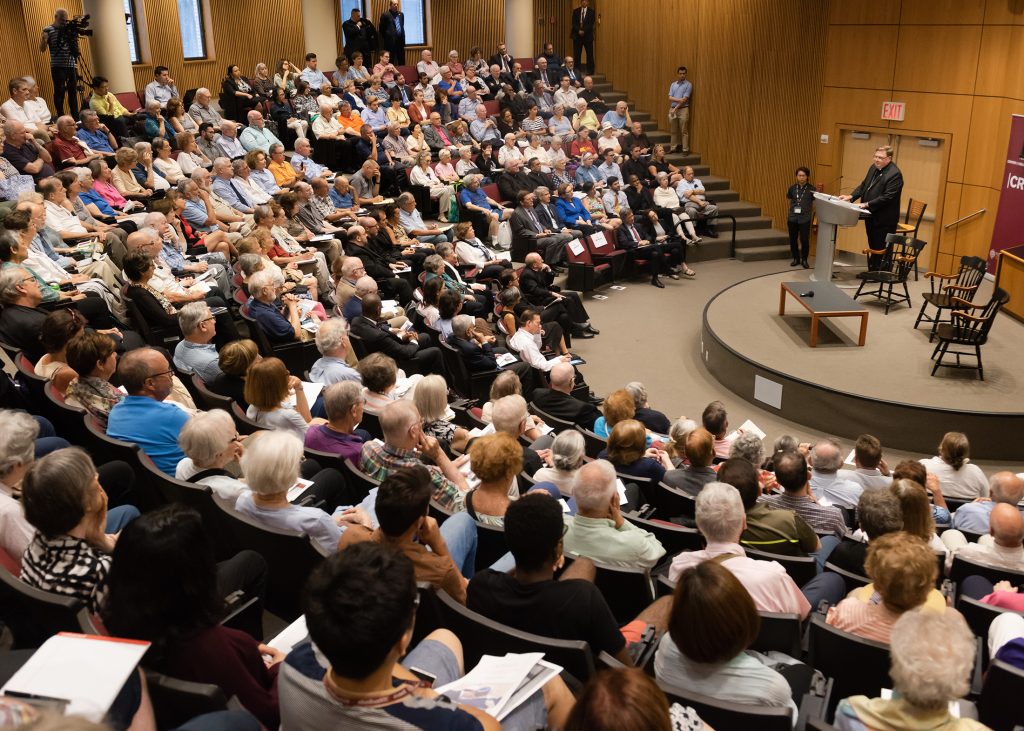According to Cardinal Joseph Tobin, Catholicism does not have a preferred economic system, but instead, stakes out principles that provide the necessary framework for a moral economy.
Tobin’s words were in response to a question from Christine Emba of the Washington Post who moderated a discussion on Wednesday evening between the archbishop of Newark and world-renowned economist Jeffrey Sachs, wherein she sought to understand why some Catholics favor a free market, while others view socialism as more compatible with Church teaching.
Yet while the topic of “A Moral Economy: Faith and the Free Market in an Age of Inequality,” hosted by Fordham University’s Center for Religion and Culture (CRC), was meant to make the case for why the Church seeks to have a voice in economic affairs, it also served as an occasion to consider how the Church’s credibility has been diminished by the scourge of clerical sex abuse.
“The Elephant in the Room”
At the start of the evening, CRC director, David Gibson, admitted that the latest revelations of clerical sex abuse have threatened to overshadow any of the good the Church is doing in the public square.
While prefacing the conversation by insisting that “we can and must address the abuse crisis and all of its manifestations,” he also maintained that “we are capable of being a both/and Church,” that seeks to address injustices wherever they exist.
Tobin later concurred saying that despite economics being the evening’s theme, recent sex abuse scandals were the “elephant in the room,” and that the “toxic culture of clergy sexual abuse and episcopal cover-up” has brought the Church to its knees.
“Not speaking about it feels a little like speaking about faith and economy the week after 9/11,” he added.
Yet despite the “scandalous, horrific situation,” and the “tremendous dent to the credibility of Church,” the cardinal said that pastors must continue to serve the truth in all areas, including economics.
As such, Tobin rejected the charge that is often made that the Church should refrain from intervening in secular or scientific spheres, challenging that the Christian faith has a public dimension to it.
Under the Francis papacy, where economic concerns have been elevated, some critics have charged that the pope’s Latin American upbringing discredits his economic worldview.
For Tobin, however, the pope’s Argentinian experience is not just essential for understanding his worldview, but is a gift that offers the Church a needed and new perspective - one marked by greater attention to the unraveling of social solidarity.
Tobin said that Francis’s call for radical social change in economic systems begins with the starting point of first looking to the peripheries, a term used often by the pope and one Tobin defined simply as “a place that’s hard to see.”
The poor in society, he warned, aren’t necessarily just the victims of overt oppression, but often go entirely unseen.
“That should keep us sweating,” he added.
Instead, Tobin called for a rejection of economic thinking that reduces the human person to their profitable capacities and called for a system that only views business as noble if it is concerned with the common good and not just the bottom line.
If embraced, he argued, “there could be a ‘revolution of tenderness,’ and the world will be left to wonder what on earth just happened.”
Catholicism and the American Experience
If it fell to Tobin to make the positive case for the Church’s vision of economic thinking, Sachs focused on the ways in which, according to him, many American ideas are in conflict with it.
“The American tradition is not the same thing as the Church’s social teaching,” Sachs argued, saying that the United States has become too comfortable with global capitalization fueled by greed.
While admitting that the free marked has unleashed incredible energy, he argued that it’s obscured the common good and actively threatens human dignity.
Instead, Sachs said, “the Church has steadfastly and brilliantly kept the vision of a moral economy” and that Francis is “the best spokesperson for this.”
Sachs, who is a non-Catholic, but has advised the Vatican for nearly three decades on economic matters, praised the way the Church has grappled with economic concerns since the industrial era and extolled papal encyclicals as offering the world a better way forward.
In particular, Sachs contended that Francis’s 2015 encyclical Laudato si’ is “one of the most important messages of our time,” and its message of integral human ecology offers a vision for human flourishing that won’t be found in business schools, economic departments, or in the halls of power.
By rejecting greed and urging concern for our common home, Sachs said that the Church raises fundamental questions about human survival and offers a better way forward that other institutions fail to see.
Although the evening’s discussion focused primarily on theory and ideas, Emba used her role as moderator to press for ways in which attendees or every day Catholics could put the ideas posited by Tobin and Sachs alike into practice.
After two hours of high-minded ideals, the audience greeted Tobin’s response “to invite an immigrant family to supper” with thunderous applause.
“I can’t argue with that,” Sachs concluded.


